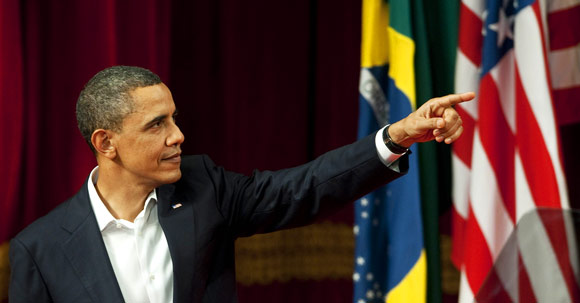
(above) President Obama, shown after delivering a speech at the Municipal Theater in Rio de Janeiro, has returned from a five-day trip to Latin America. (Antonio Scorza / AFP / Getty Images)
In Latin America, Obama shows tough, humble sides
March 24, 2011 - LA Times
President Obama turned on the charm in Latin America, with an eye to ousting China as Brazil's top trade partner in order for the U.S. to cash in on the 2016 Olympics building boom.
By Peter Nicholas, Los Angeles Times
Reporting from San Salvador -- Barack Obama returned home this week from his trip to Latin America having showcased two distinctly different faces of presidential power: one humble, the other resolute.
He ordered a cruise missile assault against the Libyan regime on the first day of the trip, kicked soccer balls with Brazilian kids on the second. He issued warnings to the Libyan ruler, made a toast to the Chilean president.
It was a tough balance to strike: a charm offensive in Latin America paired with a military campaign in North Africa. In the end, Obama came home a few hours early Wednesday, ditching a sightseeing trip in San Salvador and putting himself back in the White House as the military intervention in Libya continued its uncertain course.
It may take years to see whether Obama's five-day visit to the region paid off in economic benefits for the United States, as he hoped, but he made headway in recasting the nation's often troubled relationship with its southern neighbors, experts on the region said.
"He demonstrated grace without grandiosity, the latter something Latin Americans are especially leery of in U.S. presidents," said Julia E. Sweig of the Council on Foreign Relations. She said Obama made historic steps in U.S. relations with each of the three countries he visited: Brazil, Chile and El Salvador.
"It's just too bad Americans were unable to focus" because of preoccupation with Libya, she said.
Obama never stated it directly, but a clear goal of the trip was to outdo China in the competition for Latin American markets. With billions of dollars in construction contracts to give out in advance of the 2016 Olympics, Brazil is in a prime position to help jump-start the sluggish U.S. economic recovery. Obama would love for his country to replace China as Brazil's top trade partner.
He made the case by emphasizing the cultural and political affinity between North and South America. Both are committed to democracy, he said, an implicit swipe at China's authoritarian government.
But he also acknowledged that the United States has erred in its dealings with Latin America and occasionally taken it for granted. He asked the region to move beyond old resentments.
Not so easy. At a news conference, a Chilean reporter told him of "open wounds" stemming from Augusto Pinochet's military coup in 1973. Would the U.S. examine its role in Pinochet's rise?
Obama said the U.S. "would like to cooperate."
"I think it's very important for all of us to know our history," he said. "And obviously the history of relations between the United States and Latin America have at times been extremely rocky and have at times been difficult. I think it's important, though, for us, even as we understand our history and gain clarity about our history, that we're not trapped by our history."
He would like to have come home with a few more deals sewn up. A major prize is a Brazilian contract for new fighter planes. But the fate of the contract is murky. The U.S. is one of several countries in the running.
Obama played pitchman, touting the F/A-18 Super Hornet as the "best plane on offer" in his private meeting Saturday with Brazilian President Dilma Rousseff, White House aides said.
She gave no hint of how she was leaning.
In wooing Latin American leaders, Obama has a natural advantage by dint of race. His status as the first black president is especially meaningful to Brazilians, who've had their own difficult history with slavery.
A total of 40% of African slaves brought to the New World came to Brazil before slavery was abolished in 1888, and nearly 45% of the population considers itself mulatto or black, according to the 2000 census.
Obama didn't invoke his racial heritage on the trip, but the country was well aware of it.
Benedita da Silva, a Brazilian elected official, said in an interview: "His arrival is very important in the commercial and political relations with the U.S. It's symbolic to have the first Negro U.S. president meeting the first female Brazilian president. It's meaningful."
As the trip wore on, Obama alternated between the soft and hard exercise of American influence. In Brasilia, the Brazilian capital, he depicted Libyan leader Moammar Kadafi as a tyrant whose military advance would be stopped by force.
In San Salvador he made a pilgrimage to the tomb of slain Salvadoran Archbishop Oscar Romero. The visit was widely appreciated here: recognition of the importance of a cleric and human rights champion who was assassinated at the outset of a civil war by the side U.S. governments would come to support.
It is unclear whether Obama will meet his goals in North Africa or Latin America. But on the trip that just ended, he made full use of his tools -- power and persuasion -- to put a stamp on both parts of the world.
Times staff writer Tracy Wilkinson in San Salvador and special correspondent Marcelo Soares in Sao Paulo, Brazil, contributed to this report.